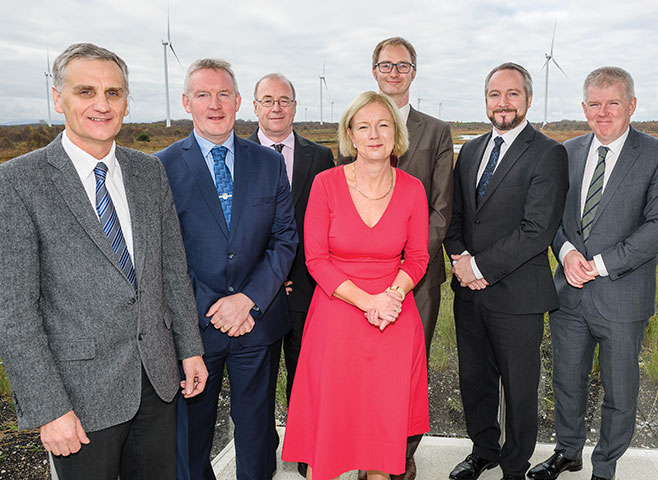
Ireland’s ambition:What should our renewable energy targets be for 2030?
10th November 2017
Stability within a fast changing energy market
10th November 2017Why corporates will accelerate transition to renewables

In an era of reduced tariff support for renewable energy projects, there is much greater focus on the possibility of providing renewable energy either directly or indirectly to the corporate sector.
Corporates are not just significant consumers of renewable energy but are also becoming investors in the sector in their own right. Our view is that there are some macro forces at play which will drive corporates to seek to transition to 100 per cent renewable power over the next 10 years at a much accelerated pace. This is a major positive for the renewable energy generators not just in Ireland but globally and is a cause for optimism. While there are many different factors at play including seeking certainty on matters such as future energy pricing and security of supply, this article looks at some of the less obvious but very real economic forces at play which will help drive this transition.
1. Non-financial reporting Directive
Although not sufficiently ambitious in its implementation and detail, this is the first pan-European Directive pushing corporates to formally report on underlying pre-financial information in a more robust and consistent fashion. The Directive has multiple benefits to both management and investors. For management, it begins to provide a framework for the often too ‘fuzzy’ area of sustainability thereby allowing leaders to be recognised and excel. For investors, it presents the beginnings of a comparable set of disclosures from which they can make informed decisions and fulfil their increasing obligation to fiduciary duty. Most leading multi-national groups are now preparing sustainability reports or something similar and which demonstrates their contribution to the sector including their involvement in renewable energy.
2. FSB Task Force on Climate Related Financial Disclosures
Climate change is emerging as a threat to the stability of the financial system and as a result, the G20 Finance Ministers and Central Bank Governors asked the Financial Stability Board (FSB) to review how the financial sector can best take account of climate related risks.
In order for investors, lenders, insurers and other financial stakeholders to build climate related risks into their decisions, corporations need to provide the relevant financial information. However, this information is not currently available as part of the normal financial reporting requirements for such entities. This is why the Task Force on Climate-related Financial Disclosures has worked to identify key climate related risks, to capture the information that stakeholders need and to understand the challenges that corporations face in providing this information. While there is a lot of detail in the recommendations, the key point is that corporations are being asked to identify and quantify the financial impact of climate related risks (focusing on transitional and physical risks) in their organisation and to outline the potential threats and opportunities to their own stakeholders through appropriate financial disclosure.
At present, this is a voluntary requirement but in time the recommendations will become obligatory similar to what we have seen in relation to non-financial disclosures at a minimum, this will become best practice particularly given the sentiments of the investment community as discussed below. Even more than the case with non-financial disclosures, the requirement to assess and possibly account for climate related risks is going to drive corporate behaviour in the right direction. This has the potential to impact on a profit and loss account which ultimately becomes relevant to a company’s share price and investor sentiment. This will force corporates to think much more constructively about resource efficiency, renewable energy and other climate change mitigants.
“For those of us involved in the development and generation of renewable energy, it is important that the sector continues to develop to meet the ever growing demand from corporates.”
3. Responsible investment
The whole area of responsible/ESG (Environmental Social Governance) investment has been well publicised and while it would have been seen as a side show a number of years ago, the reality is that it has now become the mainstream and as a result any entity seeking large-scale institutional investment is at a disadvantage if it cannot demonstrate its attractiveness to those investors who are taking ESG into consideration. This is driven by hard economic considerations – the perception in the investment community is that corporations who do not take ESG factors into account are unlikely to be the winners in the long term.
This in itself does not directly lead to increased opportunities for developers of renewable projects (but it does increase the quantum of available capital) – however the reality is that large global corporations will take this very seriously. Corporations are starting to realise that by transitioning their own energy requirements to 100 per cent renewable is going to increase their own attractiveness to the investment community and as a consequence this will help drive greater corporate demand for renewable power.

4. Peer pressure
The fourth major factor which we see driving corporate behaviour is the impact of peer pressure in each sector. We are well aware of the requirement for greenness from the software sector and in particular the desire to be associated with additional green power. However this is true of other sectors also including the pharmaceutical and large industrial sectors. For example, the RE 100 club is an organisation containing 100 of some of the largest and most influential global corporations and which has made a commitment to go 100 per cent renewable. This has generated a lot of attention and is going to help force the pace across the wider corporate community.
Conclusion
These are just some of the factors which we think are becoming a reality not just in the future but today. For those of us involved in the development and generation of renewable energy, it is important that the sector continues to develop to meet the ever growing demand from corporates. From the Irish Government’s perspective, plentiful local supply of renewable energy is going to be an important selling point for FDI purposes particularly given the type of global corporations we are trying to attract into this country. It will be important for Government to ensure that the correct policy framework is in place to make all of this a reality and to ensure that any barriers are removed.

